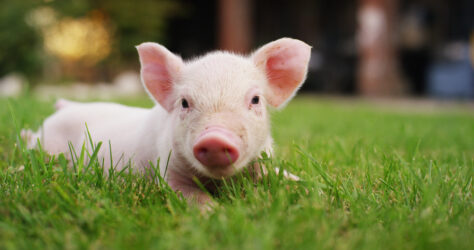States’ Rights Lose Again
Joel Salatin|January 27, 2024

The battle between states’ rights and federal intervention never ends. Recent news shines an interesting light on the tension.
Historically, conservatives have favored a smaller federal government and more autonomy at the state and local levels. Liberals tend to think every issue needs a federal solution.
Several years ago, California voted on Proposition 12. It sought to prohibit Californians from buying or selling pork from pigs born to sows held in gestation crates. And it received tremendous scrutiny in the state vs. federal space.
The proposition passed, to the praise of animal welfare advocacy groups. It was applauded as a win for pigs.
In case you don’t know what a gestation crate is, it’s a mama-pig-sized tubular steel box. It was developed decades ago to reduce deaths from piglets being crushed under a sow’s feet.
These crates prevent a sow from moving forward, backward or sideways. She can stand up or lie down, but she can’t turn around or really take a step.
Sows in industrial complexes known as factory farms live in these crates their entire lives. Anyone who sees a pig as anything more than a machine knows that isn’t much of a life.
Animal welfare advocates were ecstatic at this slap in the face to the industrial farming sector.
Farmers in Iowa didn’t share their joy. California doesn’t raise much pork. It imports nearly all of its pork from other states, especially Iowa.
The National Pork Producers Council responded by suing California for interfering in interstate commerce. The council reasoned that the policy reached beyond California to Iowa, Nebraska and other hog-producing states. The council thought it was unfair for one state to be able to dictate what folks in another state did.
Of course, California countered that Prop 12 didn’t inherently impact Iowa because Iowa could change its protocols to comply with the more animal-friendly requirements or farmers in California could begin raising hogs in compliance with the new rules.
In any case, Prop 12 regulated commerce only in the state of California. The case went to the U.S. Supreme Court, which ruled in favor of California.
Immediately, the industrial farmer coalition began lobbying politicians for relief.
Friends in High Places
And the coalition got legislators to introduce the Ending Agricultural Trade Suppression (EATS) Act, which is being supported by senators from Big Ag states, including Roger Marshall, Chuck Grassley, John Cornyn, Tom Cotton and many others.
The bill would prohibit states and local jurisdictions from interfering with the production and distribution of agricultural products in interstate commerce.
Lining up in favor of it are all the Big Ag lobbyists: the American Farm Bureau Federation, the National Cattlemen’s Beef Association, the National Pork Producers Council, the Kansas Corn Growers Association… you get the picture.
Their arguments start with the idea that one state can’t force regulations on other states. They believe Prop 12 will drive up food costs… make it more difficult to feed other countries… and possibly make grocery stores barren.
The sky is falling, they say. We won’t be able to find any food at the supermarket, all because California said gestation crate-farrowed pigs can’t be bought or sold in the state.
What’s most interesting about this particular tension between states’ rights and federal intervention is that the coalitions lining up on each side are in opposition to their historical political biases.
Typically, liberals want federal intervention. But in this case, they are all screaming for states’ rights… as if they are the stalwart defenders of states’ rights.
I wonder what these folks would say about right-to-work states, medical freedom, education privatization and a host of other state-level initiatives.
Never mind… I know what they would say, because they’ve made their sentiments well known.
On the flip side, conservatives, who constantly complain about federal intervention in state autonomy, are the ones demanding a federal remedy.
Their argument shows how little conviction they have when state autonomy threatens their livelihoods.
A Warning
For the record, commercial hogs can be raised profitably without gestation crates.
At our farm, we raise hundreds of hogs a year on our pasture and buy our weanling piglets from half a dozen farmers in the region who use a free-roaming birthing model.
The notion that grocery store shelves would be bare if we got rid of gestation crates is ridiculous, but scaring people always seems to score political points.
This issue is no exception.
Whether this bill is a stand-alone measure or eventually gets incorporated into the upcoming farm bill, it is a classic example of the ongoing battle between state autonomy and federal meddling.
But, again, what’s particularly interesting about this fight is that both sides have gone against their normal thinking.
Libertarians would normally prefer to let a smaller governmental structure hold sway. In other words, they would prefer to let the federal government rule over as few things as possible.
If a state or municipality doesn’t want to allow strip joints, the folks there should be able to prohibit them. Same with alcohol or walnut dining room tables. At the local level, customized legislation creates uniqueness and personality. And it creates the opportunity for lots of experiments in governance, which is what having 50 states was all about.
How disappointing it is that folks who brand themselves small-government advocates can’t see their hypocrisy on this position.
And that should be a warning to us all about the folks in charge.

Joel Salatin
Joel Salatin calls himself a Christian libertarian environmentalist capitalist lunatic farmer. Others who like him call him the most famous farmer in the world, the high priest of the pasture, and the most eclectic thinker from Virginia since Thomas Jefferson. Those who don’t like him call him a bioterrorist, Typhoid Mary, a charlatan, and a starvation advocate. With a room full of debate trophies from high school and college days, 12 published books, and a thriving multigenerational family farm, he draws on a lifetime of food, farming and fantasy to entertain and inspire audiences around the world.



